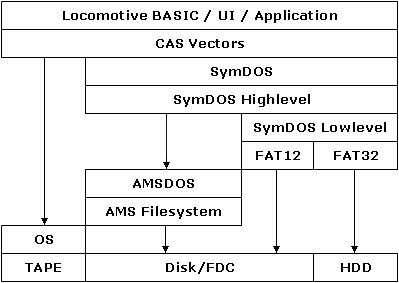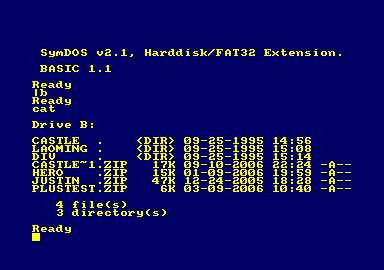SymDOS is an AMSDOS wrapper. After installing SymDOS, you will have three more drives, C:, D: and M:. SymDOS also allows to access FAT12/720kb formatted disks. Now, you can use two harddisks, a master and a slave one. The format of these harddisks is FAT32, so you can read and write Windows formatted harddisk. Finally, you can access your saved data from you CPC. SymDOS provides a RAM disk and uses all extension ram. You need minimal a CPC6128 to have 64k RAM available.See this graphic here:
If you want to view the directory of the disk with the command CAT, the CAS vectors pass through the SymDOS routines. SymDOS knows, which drive is selected, if a harddisk with |B is selected, a disk is logged as a FAT12 formatted disk or you are working with the RAM disk, all calls are forwarded to SymDOS lowlevel. Is an AMSDOS formatted disk inserted, SymDOS highlevel forwards all CAS accesses to the AMSDOS ROM.
To clarify the graphic:
You know the imported RSX commands from AMSDOS, like |DISC, |REN, |ERA and so on. Furthermore you know the BASIC statements to access disk or tape like OPENIN or LOAD, which actually calls CAS vectors. CAS vectors originally belong to cassette tape. AMSDOS alters all CAS vectors and fools the OS. SymDOS does the same with AMSDOS.
The SymDOS highlevel catches all CAS calls and RSX commands and then SymDOS decides, if these calls have to be forwarded to AMSDOS or to SymDOS lowlevel. The SymDOS lowlevel accesses the RAM, harddisk or FAT12 formatted disks.
The user doesn't realise anything of all these routings.

